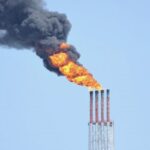Neom: Forces ‘told to kill’ to clear land for eco-city
According to a former intelligence officer who spoke with the BBC, Saudi authorities have authorized the use of deadly force to clear land for a futuristic desert city being constructed by numerous Western corporations.
Colonel Rabih Alenezi alleges he was instructed to remove villagers from a tribe in Saudi Arabia’s Gulf region to make room for The Line, a component of the Neom eco-initiative. One villager was reportedly shot and killed for protesting the eviction.
Both the Saudi government and Neom management declined to comment on the matter.
Neom, a $500 billion eco-development in Saudi Arabia, is part of the country’s Vision 2030 plan to reduce reliance on oil.
The Line, its flagship project, is envisioned as a car-free city stretching 170km in length but only a small fraction is expected to be completed by 2030. Numerous global companies, including several British firms, are participating in Neom’s construction.
The region where Neom is being established has been described as an ideal “blank canvas” by Saudi Crown Prince Mohammed bin Salman.
However, over 6,000 individuals have been relocated for the project, with estimates suggesting even higher numbers, according to UK-based human rights group ALQST.
Satellite imagery analyzed by the BBC shows the obliteration of villages such as al-Khuraybah, Sharma, and Gayal, including homes, schools, and hospitals.
Colonel Alenezi, who sought refuge in the UK, reveals that the eviction order he received targeted al-Khuraybah, inhabited by the Huwaitat tribe for generations.
The order allegedly sanctioned the use of lethal force against those who resisted eviction. Despite evading the mission, Saudi authorities proceeded with the clearance, resulting in the fatal shooting of Abdul Rahim al-Huwaiti, who had refused to cooperate with the land valuation committee.
Saudi state security claimed al-Huwaiti had opened fire on security forces, justifying their retaliation. However, human rights organizations and the UN contend that he was killed merely for resisting eviction.
Although Col Alenezi’s claims regarding lethal force could not be independently verified, a source familiar with Saudi intelligence operations corroborates the essence of his testimony.
Numerous villagers who resisted eviction were reportedly detained, with many facing terrorism-related charges. Several individuals were arrested for expressing grief over al-Huwaiti’s death on social media.
While Saudi authorities assert that compensation has been offered to those displaced for The Line, the actual amounts received are allegedly much lower than promised.
According to Col Alenezi, Neom represents the pinnacle of Mohammed Bin Salman’s vision, which explains the harsh measures taken against the Huwaitat. A former Neom executive, Andy Wirth, learned of al-Huwaiti’s killing before joining the project in 2020.
Despite seeking clarification from his employers, Wirth remained dissatisfied with the responses and eventually departed the project due to disillusionment with its management.
A chief executive of a British desalination company who pulled out of a $100m (£80m) project for The Line in 2022 is also extremely critical.
“It might be good for some high-tech people living in that area, but what about the rest?” said Malcolm Aw, the CEO of Solar Water PLC.
The local population should be seen as valuable assets, he added, given how well they understand the area.
“You should seek that advice to improve, to create, recreate, without removing them.”
Displaced villagers were extremely reluctant to comment, fearing that speaking to foreign media could further endanger their detained relatives.
But we spoke to those evicted elsewhere for another Saudi Vision 2030 scheme. More than a million people have been displaced for the Jeddah Central project in the western Saudi Arabian city – set to include an opera house, sporting district, and high-end retail and residential units.
Nader Hijazi [not his real name] grew up in Aziziyah – one of approximately 63 neighbourhoods affected by those demolitions. His father’s home was razed in 2021, for which he received less than a month’s warning.
Hijazi says the photos he had seen of his former neighbourhood were shocking, saying they evoked a warzone.
“They’re waging a war on people, a war on our identities.”
Saudi activists told the BBC of two individuals arrested last year in connection with the Jeddah demolitions – one for physically resisting eviction, the other for posting photos of anti-demolition graffiti on his social media.
And a relative of a detainee in Jeddah’s Dhahban Central Prison said they had heard accounts of a further 15 people being held there – reportedly for staging a farewell gathering in one of the neighbourhoods marked for demolition.
The difficulty of contacting those inside Saudi prisons means we have not been able to verify this.
ALQST surveyed 35 evicted people from Jeddah neighbourhoods. Of those, none say they had received compensation, or sufficient warning, in accordance with local law, and more than half said they had been forced out of their homes under threat of arrest.
Col Alenezi is now based in the UK but still fears for his security. He says an intelligence officer told him that he would be offered $5m (£4m) if he attended a meeting at London’s Saudi embassy with the Saudi interior minister. He refused. We put this allegation to the Saudi government but they did not respond.
Attacks on critics of the Saudi government living abroad are not without precedent – the most high-profile being that on US-based journalist Jamal Khashoggi, murdered by Saudi agents inside the country’s Istanbul consulate in 2018.
A damning US intelligence report concluded Mohamed Bin Salman approved the operation. The crown prince has denied any role.
But Col Alenezi has no regrets about his decision to disobey orders regarding Saudi’s futuristic city.
“Mohamed Bin Salman will let nothing stand in the way of the building of Neom…I started to become more worried about what I might be asked to do to my own people.”

